
BULLETIN OF GEOSCIENCES
Scope & Guideline
Illuminating the Intersections of Geology and Environment
Introduction
Aims and Scopes
- Paleontological Studies:
The journal emphasizes research on fossil organisms, including their taxonomy, morphology, and evolutionary history, contributing to the broader understanding of Earth's biological past. - Stratigraphy and Biostratigraphy:
Research related to the stratigraphic framework of geological formations and the biostratigraphical correlation of fossils is a core focus, aiding in reconstructing historical geological events. - Sedimentology and Depositional Environments:
The journal publishes studies on sedimentary processes, depositional environments, and the sedimentary record, which are crucial for understanding past climates and ecological systems. - Geobiology and Paleoecology:
Research examining the interactions between biological and geological processes throughout Earth’s history, including the impact of organisms on sedimentary environments and vice versa. - Regional Geology and Paleogeography:
The journal covers regional geological studies that explore the paleogeographical context of fossil findings and sedimentary sequences, providing insights into historical continental configurations.
Trending and Emerging
- Evolutionary Biology and Fossil Record:
There is a growing emphasis on the evolutionary origins and diversity of various taxa, particularly in relation to fossil evidence, showcasing a trend towards integrating evolutionary biology with paleontological research. - Geo- and Biogeography:
Emerging studies on the geographic distribution of fossils and their implications for understanding historical biogeographical patterns reflect an increasing interest in how geological and biological processes intersect. - Paleoecological Dynamics:
Research focusing on paleoecological interactions, including community dynamics and ecological responses to environmental changes, has gained traction, underscoring the importance of understanding past ecosystems. - Technological Advances in Paleontological Methods:
The integration of new technologies and methodologies in paleontological research, such as advanced imaging and analytical techniques, is becoming a prominent theme, enhancing the quality and scope of fossil studies.
Declining or Waning
- Recent Advances in Insect Paleontology:
Though insect paleontology was previously a significant theme, fewer studies focusing on this area have emerged in recent years, indicating a possible waning interest or shifting focus to other fossil groups. - Microfossils and Foraminifera Research:
Research on microfossils, particularly foraminifera, has seen a decline, suggesting a reduced emphasis on this aspect of paleontology within the journal's recent publications. - Contemporary Climate Studies:
While climate-related research is crucial, there appears to be a decline in studies specifically linking paleontological findings to contemporary climate issues, which may reflect a broader trend in geosciences.
Similar Journals

Swiss Journal of Geosciences
Pioneering Geosciences for a Sustainable FutureSwiss Journal of Geosciences is a prestigious academic journal dedicated to advancing the field of geosciences, published by SPRINGER INTERNATIONAL PUBLISHING AG. Since its inception in 2007, the journal has established itself as a leading platform for disseminating high-quality research findings in various domains related to Earth and planetary sciences, achieving a notable Q1 ranking in Geology as of 2023. With a solid reputation reflected in its Scopus ranking of Rank #72/321, the journal stands in the 77th percentile within its category. Based in Switzerland, the Swiss Journal of Geosciences embraces an open access model, making it easier for researchers, professionals, and students worldwide to access vital geological research without barriers. The journal’s objectives include promoting interdisciplinary research and fostering insights that address both fundamental and applied geoscientific problems, ensuring it remains a crucial resource for those seeking to understand our planet’s dynamics. Engage with pioneering research and contribute to the vibrant community of geoscientists by exploring the impactful articles published within its pages.

JOURNAL OF IBERIAN GEOLOGY
Connecting scholars to the heart of Iberian Earth sciences.JOURNAL OF IBERIAN GEOLOGY, published by Springer International Publishing AG, is a pivotal platform dedicated to advancing the field of geology and stratigraphy. With an ISSN of 1698-6180 and E-ISSN of 1886-7995, this journal has earned its reputation in the academic community, holding a commendable Q2 ranking in both Geology and Stratigraphy for 2023, reflecting its contributions to contemporary geological research. Spanning from 2007 to 2024, it provides a comprehensive forum for scholars and practitioners from around the globe to disseminate their findings pertaining to the Iberian Peninsula, enhancing the understanding of regional geological phenomena. The journal has carved out a significant niche within the Earth and Planetary Sciences, ranking #137 out of 321 in Geology and #24 out of 55 in Stratigraphy, indicating its wide-reaching impact and scholarly engagement. The Journal of Iberian Geology serves as an indispensable resource for those interested in the complexities of geological structures, stratigraphic sequences, and the broader implications of geological research, making it a vital reference for researchers, professionals, and students alike.
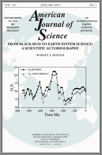
AMERICAN JOURNAL OF SCIENCE
Shaping the Future of Planetary ResearchThe American Journal of Science, published by the esteemed Amer Journal Science, stands as a leading platform for groundbreaking research in the field of Earth and Planetary Sciences. With an impressive impact factor and distinguished Scopus rank 34/195 in its category, the journal occupies a prestigious position in the academic community, reflecting its high-quality and influential contributions to scientific knowledge. The journal’s objective is to disseminate original research, comprehensive reviews, and critical discussions that advance our understanding of geological processes and planetary phenomena, supporting scholars and practitioners in their pursuit of knowledge. Despite its traditional publication structure, viewers can explore its rich repository of works dating from 1945 to present, offering a wealth of insights into the dynamic Earth sciences. The journal remains a vital resource for researchers, professionals, and students eager to engage with the latest scientific findings and foster further innovation in the field.
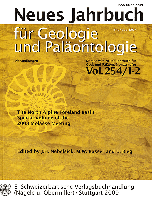
NEUES JAHRBUCH FUR GEOLOGIE UND PALAONTOLOGIE-ABHANDLUNGEN
Exploring the Depths of Earth’s HistoryNEUES JAHRBUCH FUR GEOLOGIE UND PALAONTOLOGIE-ABHANDLUNGEN, published by E SCHWEIZERBARTSCHE VERLAGSBUCHHANDLUNG, is a distinguished scholarly journal based in Germany that has made significant contributions to the field of Earth and Planetary Sciences with a particular emphasis on Paleontology. With its ISSN: 0077-7749, this journal provides an essential platform for researchers, professionals, and students to explore cutting-edge research and developments that enhance our understanding of geological and paleontological processes. Boasting a robust ranking of #67 out of 113 in Scopus for the category of Earth and Planetary Sciences and achieving a Q3 quartile ranking in Paleontology, it stands as a significant resource in the global academic community. Though not an open-access journal, it offers valuable insights from 1987 onwards, ensuring a comprehensive archive of high-quality research articles published from 1995 to 2024. Its scholarly impact continues to resonate, making it a vital reference point for advancements in the ever-evolving disciplines of geology and paleontology.
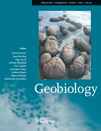
Geobiology
Leading the Charge in Interdisciplinary Earth ResearchGeobiology, published by WILEY, is a prestigious journal at the forefront of interdisciplinary research in Earth and Planetary Sciences, Ecology, and Environmental Science. With an ISSN of 1472-4677 and an E-ISSN of 1472-4669, this journal has achieved remarkable recognition as evidenced by its Q1 categorization in multiple relevant fields, including Earth and Planetary Sciences, Ecology, and Environmental Science, according to the 2023 quartile rankings. Covering a diverse range of topics from biogeochemical cycles to the impacts of climate change on biodiversity, Geobiology serves as a vital platform for researchers, professionals, and students alike. The journal boasts impressive Scopus rankings, placing it within the top tiers of its fields, which is indicative of its significant influence and contribution to advancing knowledge. Although it does not operate under an Open Access model, Geobiology ensures widespread reach and accessibility, allowing for impactful dialogues within the scientific community. Researchers are encouraged to submit their findings and engage with cutting-edge studies to advance our understanding of the interplay between biological and geological processes.
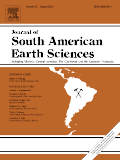
JOURNAL OF SOUTH AMERICAN EARTH SCIENCES
Pioneering Research in South American Earth SciencesJOURNAL OF SOUTH AMERICAN EARTH SCIENCES is a premier interdisciplinary journal dedicated to publishing high-quality research in the fields of Earth-Surface Processes, Geology, and Paleontology, making it an essential resource for scientists and researchers focused on South American geology and its diverse geological phenomena. Published by Pergamon-Elsevier Science Ltd in the United Kingdom, this journal has been instrumental in disseminating groundbreaking studies since 1988, showcasing contributions that push the boundaries of knowledge in Earth and Planetary Sciences. With an impressive Scopus ranking—positioning it in the 74th percentile for Paleontology and 71st for Geology—this journal not only reflects robust academic quality but also its commitment to addressing critical geological challenges in South America. Researchers will appreciate its objective of advancing understanding of geological processes while providing insights into past, present, and future Earth environments. Although available through traditional subscription models, the journal's vast repository of articles enriches the academic landscape, facilitating the sharing of vital research among professionals, students, and geological practitioners.

FACIES
Pioneering Knowledge in Geology, Paleontology, and StratigraphyFACIES is a prominent academic journal published by Springer, dedicated to advancing knowledge in the fields of Geology, Paleontology, and Stratigraphy. With its rich history since 1979 and an impactful convergence of research efforts extending through 2024, FACIES has established itself as a vital resource for scholars and practitioners. The journal boasts impressive ranking metrics: it is positioned in Q2 within Geology and Stratigraphy, and Q1 in Paleontology, reflecting its high-quality contributions to the academic community. Furthermore, its notable Scopus ranks—#28 in Paleontology, #16 in Stratigraphy, and #91 in Geology—underscore its influence and relevance. Although not an open-access journal, FACIES continues to provide significant findings that inform geological practices and enrich our understanding of past and present Earth systems. It serves as an essential platform for innovative research, making it invaluable for researchers, professionals, and students who seek to impact the fields of Earth sciences.
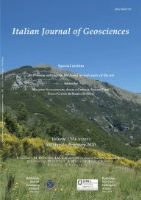
Italian Journal of Geosciences
Advancing Geosciences: Bridging Knowledge and InnovationItalian Journal of Geosciences, published by the Società Geologica Italiana, is a distinguished platform for the dissemination of research in the fields of Earth and Planetary Sciences and Geology. With an impressive impact factor reflected in its 2023 rankings, where it placed in the Q3 category across its related fields, this journal serves as a vital resource for academics, practitioners, and students. Established in 2010 and poised to continue until 2024, the journal showcases critical advancements and interdisciplinary studies that deepen our understanding of geological processes and Earth systems. Operating under open access options, it offers robust accessibility to a broad audience, facilitating wider dissemination of knowledge. The journal's affiliation with Università degli Studi La Sapienza in Rome, Italy, further underscores its commitment to academic excellence and innovation in geosciences.

Moscow University Geology Bulletin
Fostering Interdisciplinary Dialogue in GeosciencesMoscow University Geology Bulletin, published by SPRINGER INT PUBL AG, is a prominent platform for disseminating critical research in the field of Earth and Planetary Sciences. With an ISSN of 0145-8752 and an E-ISSN of 1934-8436, this journal is well-regarded for its contributions to diverse geological studies and interdisciplinary advancements that shape our understanding of the planet. The journal has established itself in the academic community, particularly noted for its ranking in the Q3 category within Earth and Planetary Sciences as of 2023. Despite its limited open-access options, the Moscow University Geology Bulletin remains an essential resource for researchers, professionals, and students through its well-curated articles and synthesis of geoscientific knowledge. With annual volumes converging from various years, including significant years like 2012 to 2024, it aims to uphold its mission of fostering scholarly dialogue and innovation in the geosciences.

STRATIGRAPHY AND GEOLOGICAL CORRELATION
Connecting Geological Dots for a Deeper UnderstandingSTRATIGRAPHY AND GEOLOGICAL CORRELATION is a prominent scholarly journal published by PLEIADES PUBLISHING INC, featuring a dedicated focus on the fields of geology, stratigraphy, and paleontology. With ISSN 0869-5938 and E-ISSN 1555-6263, this journal has been disseminating significant research findings since its inception in 1994, continuously contributing to the academic discourse through 2024. Despite not currently offering open access, its relevance is underscored by its Category Quartiles for 2023, where it has established itself as Q3 in Geology and Paleontology, and Q2 in Stratigraphy. STRATIGRAPHY AND GEOLOGICAL CORRELATION ranks #29 out of 55 in Stratigraphy and #186 out of 321 in Geology according to Scopus metrics, positioning it within the competitive landscape of Earth and Planetary Sciences. Researchers, professionals, and students are invited to engage with the journal’s content to deepen their understanding and foster innovation within these critical areas of study.